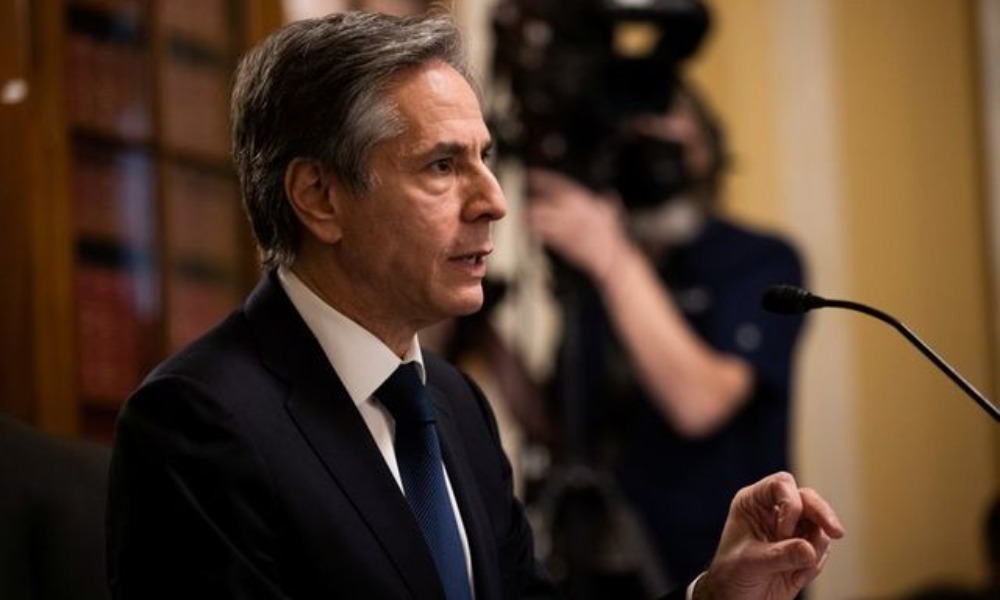Latest News
Blinken says US is not planning to lift existing sanctions

The United States said Tuesday that it will not lift existing sanctions on the Islamic Emirate but it will continue sending humanitarian aid to vulnerable people in Afghanistan.
Testifying before Congress on the withdrawal of troops from Afghanistan, US Secretary of State Antony Blinken emphasized that humanitarian aid would flow through NGOs and UN agencies in Afghanistan.
“We’ll continue to support humanitarian aid to the Afghan people. Consistent with sanctions, this aid will not flow through the government, but rather through independent organizations like NGOs and UN agencies,” Blinken said.
Blinken’s remarks came on the heels of comments made by the Islamic Emirate of Afghanistan’s Acting Foreign Minister Mawlawi Amir Khan Muttaqi, who called for sanctions to be lifted.
Muttaqi said urgent global help is needed to help deal with the “major humanitarian crisis” currently gripping the country.
Addressing a press conference in Kabul on Tuesday evening, Muttaqi called on Afghan expats to return home to help develop the country and appealed to those in the country to stay and not migrate.
He said the government is doing everything it can to provide job opportunities.
In Blinken’s address to Congress, he said however that sanctions would remain in place but that aid would be sent to Afghanistan.
“There are significant sanctions from the United Nations on the Taliban (Islamic Emirate); there are travel restrictions on the Taliban (Islamic Emirate) and the idea that if the Taliban (Islamic Emirate) is in violation of the Security Council Resolution that we established, it will get any relief just on that alone, the UN sanctions or travel restrictions, I think that’s pretty clear that that won’t happen, that’s just one point of leverage,” Blinken said.
“We want to make sure that assistance continues to flow; humanitarian assistance, including assistance that’s directed at special needs of women and girls; we’re doing that consistent with our sanctions and we’re able to do that by working through NGO’s and the UN agencies.”
Muttaqi meanwhile said on Tuesday that security is being maintained around the country and called on foreign businesses to invest in Afghanistan.
He said the country is currently facing many problems including a brain drain. “Afghanistan is in dire need of help,” he said.
Reiterating his calls for global support, Muttaqi said the Islamic Emirate is willing to work with all countries including the United States but made it clear they “will not be dictated to”.
Calling for sanctions to be lifted against the Islamic Emirate, Muttaqi added “we can not allow any sanctions or embargoes” to be imposed on Afghanistan.
Latest News
Continued aid to Afghanistan vital for regional security: Kazakh president

Kazakhstan’s President Kassym-Jomart Tokayev has emphasized the continuation of humanitarian assistance to Afghanistan, stating that the ongoing provision of such aid plays an important role in ensuring regional security.
Speaking at the international conference “Peace and Trust” in Ashgabat, the capital of Turkmenistan, Tokayev described addressing complex humanitarian challenges and the reconstruction of Afghanistan as a necessity.
“To ensure regional security, we consider it essential to continue providing assistance to Afghanistan, including by strengthening international efforts to address complex humanitarian issues and the reconstruction of this country. Kazakhstan remains committed to supporting the people of Afghanistan through humanitarian aid, educational projects, trade development, and food security initiatives,” he said.
Meanwhile, experts believe that sustainable improvement of the humanitarian situation in Afghanistan requires broad cooperation from the international community and support for the country’s economic development.
“Investment can be defined as one of the fundamental drivers of the economic cycle, and whenever Afghan traders do not take their money out of the country and instead invest domestically, it naturally leads to greater growth and dynamism in Afghanistan’s economy,” said Abdul Zahoor Modabber, an economic analyst.
As the humanitarian crisis in Afghanistan continues, reports by international relief organizations indicate that millions of citizens of the country are in urgent need of food, health, and livelihood assistance.
The reduction in funding for aid organizations, the impacts of climate change, and the return of migrants have increased concerns about a further deterioration of the humanitarian situation in the country.
Latest News
Islamic Emirate declines to attend Tehran meeting on Afghanistan
Latest News
Sirajuddin Haqqani: A government that intimidates its people is not a true government

Khalifa Sirajuddin Haqqani, Minister of Interior of the Islamic Emirate of Afghanistan, said during a visit to Khost province on Friday that any government which rules through fear cannot be considered a true government.
“A government is one that is loved by its people, one that serves them with respect and compassion, and from whose behavior people learn ethics and sincerity,” he said.
Haqqani also stressed that Afghans who opposed the Islamic Emirate in the past should be tolerated and treated in a way that helps eliminate hostility and animosity, paving the way for national cohesion.
-

 Sport4 days ago
Sport4 days agoILT20: Desert Vipers edge Gulf Giants in historic super over thriller
-

 Latest News2 days ago
Latest News2 days agoMuttaqi: Afghanistan’s progress requires both religious and modern education
-

 Regional4 days ago
Regional4 days agoSix Pakistani soldiers killed in TTP attack in Kurram District
-

 Business4 days ago
Business4 days agoTrade bodies warn almost 11,000 Afghan transit containers stuck at Karachi port
-

 World4 days ago
World4 days agoPowerful 7.6 earthquake hits northern Japan, tsunami warnings issued
-

 Latest News3 days ago
Latest News3 days agoTrump calls Afghanistan a ‘hellhole’ country as US expands immigration restrictions
-

 Sport5 days ago
Sport5 days agoSorkh Poshan Khafi defeats Sarsabz Yashlar 4-0 in Afghanistan Champions League
-

 Sport3 days ago
Sport3 days agoCommanding wins for Arman FC and Sarsabz Yashlar in Afghanistan Champions League

























